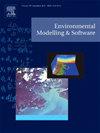离散环境因素的时空自回归神经网络插值法
IF 4.8
2区 环境科学与生态学
Q1 COMPUTER SCIENCE, INTERDISCIPLINARY APPLICATIONS
引用次数: 0
摘要
时空插值模型是产生时空离散采样点连续分布的必要条件。然而,由于时空效应的复杂性和核函数的不精确性,在时空插值方面仍然存在挑战。本文提出了一种结合自适应时空距离量化和监督学习的时空自回归神经网络插值模型(STARNN)。对海表温度和海岸营养物的10倍交叉验证模型表明,STARNN模型优于基线模型,能较好地描述环境因子的合理时空分布。通过提出两个堆叠神经网络,STARNN模型可以准确地整合时空距离,避免了核函数的主观选择。本研究建立了一种基于数据驱动的离散时空点插值模型,为模拟海温异常扩散和优化水质测量站分布提供决策支持。本文章由计算机程序翻译,如有差异,请以英文原文为准。
A spatiotemporal autoregressive neural network interpolation method for discrete environmental factors
The spatiotemporal interpolation model is necessary for generating continuous distributions for spatiotemporally discrete sampling points. However, there remain challenges in spatiotemporal interpolation due to the complex spatiotemporal effect and the imprecise kernel functions. Here, we proposed a spatiotemporal autoregressive neural network interpolation model (STARNN) that incorporates adaptive spatiotemporal distance quantification and supervised learning. The 10-fold cross-validation modelling on sea surface temperature and coastal nutrients demonstrated that the STARNN model performs better than baseline models and can well depict reasonable spatiotemporal distributions for environmental factors. By proposing two stacked neural networks, the STARNN model can accurately integrate spatial and temporal distances and avoids subjective selection of the kernel function. This study developed a novel interpolation model for processing discrete spatiotemporal points by following the data-driven paradigm, which can offer decision support for simulating the spread of sea temperature anomalies and optimizing the distribution of water quality measurement stations.
求助全文
通过发布文献求助,成功后即可免费获取论文全文。
去求助
来源期刊

Environmental Modelling & Software
工程技术-工程:环境
CiteScore
9.30
自引率
8.20%
发文量
241
审稿时长
60 days
期刊介绍:
Environmental Modelling & Software publishes contributions, in the form of research articles, reviews and short communications, on recent advances in environmental modelling and/or software. The aim is to improve our capacity to represent, understand, predict or manage the behaviour of environmental systems at all practical scales, and to communicate those improvements to a wide scientific and professional audience.
 求助内容:
求助内容: 应助结果提醒方式:
应助结果提醒方式:


